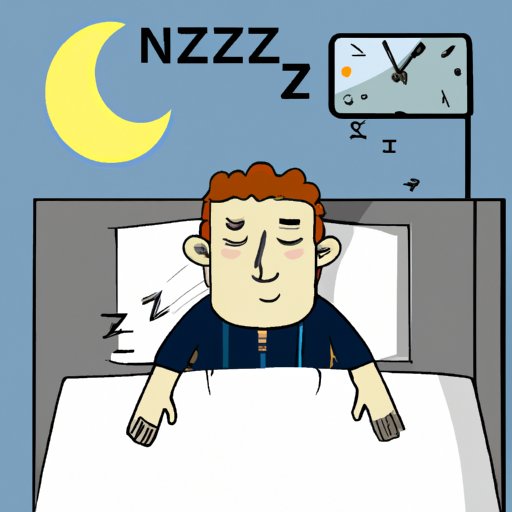Introduction
Sleeping nine hours or more in a single night may seem like an indulgence, but is it actually too much? There are various opinions on this issue, but there is no one-size-fits-all answer. This article will explore the pros and cons of getting nine hours of sleep, as well as the potential health risks associated with oversleeping. It will also look at how much sleep is optimal for different age groups and assess whether nine hours of sleep is too much for most people.

Examining the Pros and Cons of Getting 9 Hours of Sleep
There are both advantages and disadvantages to getting nine hours of sleep. On the plus side, getting enough sleep can help improve concentration, boost your immune system, reduce stress, and lower your risk of developing certain illnesses. It can also help you maintain a healthy weight and improve your overall well-being.
On the other hand, there can be drawbacks to getting too much sleep. People who sleep for prolonged periods of time may experience fatigue, irritability, and difficulty concentrating. They may also find it harder to maintain a regular sleep schedule, which can lead to further health problems.

Exploring the Impact of Sleeping Too Much on Health
Oversleeping can have both short-term and long-term effects on your health. In the short-term, it can lead to feelings of lethargy and sluggishness. It can also cause headaches, memory problems, and difficulty focusing. In the long-term, it can increase your risk of obesity, diabetes, heart disease, stroke, and depression.
Investigating How Long is Too Long to Sleep
There are several factors that can affect how long is too long to sleep. These include age, lifestyle, medical conditions, and mental health. For example, infants and young children need more sleep than adults, while those with chronic illnesses may need more sleep than those without.
In addition, those with mental health issues such as depression or anxiety may require more sleep than those without. It is important to note that sleeping too much can also have serious health consequences, so it is important to talk to your doctor if you think you might be sleeping too much.
Analyzing the Relationship Between Quality and Quantity of Sleep
The quality of sleep is just as important as the quantity when it comes to your overall health. Quality sleep means getting enough restful, deep sleep, which is essential for physical and mental well-being. Poor quality sleep can lead to fatigue, irritability, and difficulty concentrating. It is therefore important to ensure that you are getting enough quality sleep, as well as the right amount of sleep.

Looking at How Much Sleep is Optimal for Different Age Groups
The amount of sleep needed varies depending on age. Infants typically need between 12 and 16 hours of sleep per day, while children aged 3 to 5 need 10 to 13 hours. Teens should get 8 to 10 hours of sleep, while adults should aim for 7 to 9 hours. Seniors may need slightly less sleep, but still need 7 to 8 hours per night.
Understanding the Potential Risks of Oversleeping
Oversleeping can have both physical and mental health risks. Physically, it can lead to increased risk of obesity, diabetes, heart disease, and stroke. Mentally, it can lead to feelings of depression, anxiety, and fatigue. It can also interfere with concentration, memory, and productivity.

Assessing Whether 9 Hours of Sleep is Too Much for Most People
Whether nine hours of sleep is too much for most people depends on a variety of factors. For some people, nine hours of sleep may be beneficial, as it allows them to get the rest their body needs. However, for others, it may be too much, leading to fatigue, irritability, and difficulty concentrating.
It is important to remember that everyone is different and what works for one person may not work for another. The best thing to do is to listen to your body and make sure you are getting the right amount of sleep for your individual needs.
Conclusion
In conclusion, sleeping nine hours or more can have both advantages and disadvantages. On the one hand, it can provide the restful sleep that your body needs, but on the other hand, it can lead to fatigue, irritability, and difficulty concentrating. It is important to understand the potential risks associated with oversleeping, as well as how much sleep is optimal for different age groups. Ultimately, the decision of whether nine hours of sleep is too much for most people is up to the individual.


